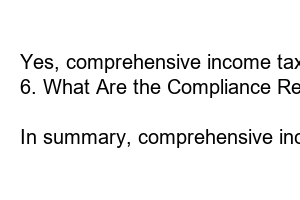종합소득세 대상자
Subject to Comprehensive Income Tax: What You Need to Know
Are you familiar with comprehensive income tax and how it may affect your finances? Whether you’re a business owner or an individual taxpayer, understanding the basics of this tax can help you make informed decisions and ensure compliance with the law. In this blog post, we’ll break down the subject of comprehensive income tax, its implications, and answer some frequently asked questions.
1. What is Comprehensive Income Tax?
Comprehensive income tax is a type of tax that is levied on the total income of an individual or a business entity. Unlike other types of taxes that focus on specific sources of income, such as salary or capital gains, comprehensive income tax considers all forms of income, including wages, investments, rental income, and dividends.
2. How is Comprehensive Income Tax Calculated?
To calculate comprehensive income tax, the total income is first determined by adding up all sources of income. Deductions and exemptions are then applied to reduce the taxable income. The tax rate is then applied to the remaining taxable income to arrive at the final tax liability.
3. Are There Different Rates for Comprehensive Income Tax?
Yes, comprehensive income tax rates may vary depending on the tax bracket one falls into. Typically, higher income levels are subject to higher tax rates, while lower income levels may enjoy lower tax rates. It’s important to consult with a tax professional or refer to the current tax laws and brackets to determine the applicable rates.
4. How Does Comprehensive Income Tax Impact Businesses?
For businesses, comprehensive income tax affects their net profits. Corporate entities are subject to corporate income tax, which is calculated based on their taxable income. This can significantly impact the overall profitability of the business and should be carefully accounted for in financial planning and decision-making processes.
5. Are There Any Exemptions or Deductions Available?
Yes, comprehensive income tax allows for certain exemptions and deductions which can help reduce an individual or business’s taxable income. These may include deductions for business expenses, charitable contributions, mortgage interest, education expenses, and more. It’s important to consult with a tax professional or refer to the tax laws to fully understand the available exemptions and deductions.
6. What Are the Compliance Requirements for Comprehensive Income Tax?
Comprehensive income tax requires individuals and businesses to file tax returns and pay the calculated tax liability by the specified deadlines. Failure to comply with these requirements can result in penalties and legal consequences. It’s crucial to stay organized, keep accurate records, and meet all tax obligations to avoid any issues.
Summary:
In summary, comprehensive income tax is a type of tax that considers all sources of income for individuals and businesses. It is calculated based on the total income, with deductions and exemptions applied to reduce taxable income. Compliance with comprehensive income tax requirements is essential to avoid penalties and ensure legal compliance. Understanding the basics of comprehensive income tax can help individuals and businesses plan their finances effectively and make informed decisions.

